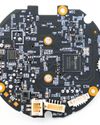
In the last of seven installments about the ubiquitous wireless protocol, Robert explores the bug corrections and new features through Bluetooth Versions 6.0. Previously he wrote about secure connections and he started the series in April 2024 with a review of the low energy protocol.
Welcome back to the world of Bluetooth. In my last six articles in Circuit Cellar, published since April 2024, I presented the overall Bluetooth Low Energy (BLE) protocol. In the first article of the series ("No Blues with Bluetooth. Part 1: An Introduction." Circuit Cellar 405, April, 2024) [1], I told you the history of Bluetooth and explained that no less than 14 Bluetooth versions have been introduced since 1999 (Figure 1). In particular, BLE was a new feature of Bluetooth 4.0.
Last month, I talked about Bluetooth 4.2 and its "Secured Connection" feature, which greatly improves the security of BLE. But what are the major features of the other Bluetooth versions? That's a nice subject to close this series, isn't it? So take a seat, and discover Bluetooth 5.0, 5.1, 5.2, 5.3, 5.4, and last but not least, the newly announced Bluetooth 6.0 (introduced in September, 2024.)
OPTIONS
Before digging into these new versions, I must remind you of a fundamental thing about Bluetooth. Each new version basically provides two things: bug corrections and new features. Bug corrections must be supported to state a compliance with a new version, but new features are always optional (at least since Bluetooth 2.0). In other words, the designer can decide whether or not to support each of the new features.
To be 100 percent clear, it is indeed possible to sell a Bluetooth 6.0 qualified device with absolutely no new features, compared to a Bluetooth 4.0 device, for example. You may argue that a customer would expect to get the newly announced features when buying a new version, but that's not necessarily the case.
Esta historia es de la edición December 2024 de Circuit Cellar.
Comience su prueba gratuita de Magzter GOLD de 7 días para acceder a miles de historias premium seleccionadas y a más de 9,000 revistas y periódicos.
Ya eres suscriptor ? Conectar
Esta historia es de la edición December 2024 de Circuit Cellar.
Comience su prueba gratuita de Magzter GOLD de 7 días para acceder a miles de historias premium seleccionadas y a más de 9,000 revistas y periódicos.
Ya eres suscriptor? Conectar

New TI MCUs Enable Edge AI and Industry-Leading Real-Time Control to Advance Efficiency, Safety, and Sustainability
Texas Instruments (TI) introduced two new series of real-time microcontrollers that deliver advancements to help engineers achieve more intelligent and secure processing in automotive and industrial applications.

Using Amazon Alexa to Control Custom IoT Gadgets
In part two of his article, Brian describes integrating custom IoT gadgets with Amazon Echo using emulation to receive spoken alarms. In part one, he used emulation and Arduino Cloud services as a middleman.

Holiday Hangover Hardware Hacking
Having too much cheer during the holidays? In this month's article, Colin offers a diversion from the jolly season by urging developers to retreat to the basement to brush up on hardware hacking skills. He shows how a low-cost Raspberry Pi Pico and a TP-Link Tapo C200 smart IP camera could become the next automated bird deterrent or a home automation server.

Datasheet: Microamps Per Megahertz Ultra-Low Power MCUs Minimize Current Consumption
How do chip makers differentiate if many ultra-low power MCUs on the market feature the same processor core? The peripherals and different power states offer various ways to manage current consumption down to microamps per megahertz.

Smart Home Lock Down Matter Provides Security Blanket
As more devices in the smart home connect to the Internet, they become increasingly vulnerable to outside attacks. Developers can now add the latest security measures to their Smart Home devices through Matter.

Basic Pulse Circuits
In part one of a three-part series, Wolfgang wrote how basic pulse circuits help digital circuits, such as embedded boards with ARM processors, deal with pulse trains or bursts of pulses from the outside. In Part 2, he dives into enabling flip-flops, timing parameters, and synchronization, design tasks needed to capture, detect, and filter pulses.

Building a Wi-Fi Router Watchdog
Dev created a watchdog for a Wi-Fi extender using a Raspberry Pi Pico. This monitors Wi-Fi connectivity for his smart home lighting system, which would require a reset twice a year due to rapid power interruptions.

Create Your Own PCBs with a CNC Milling Machine
Using KiCad, CopperCAM, and Candle Software

Performance Bottlenecks in Embedded Linux Solutions Analysis, Identification, and Mitigation
Good performance is a requirement for every technology, and system designers rely on operating systems to ensure fast and smooth transitions in critical applications. Fortunately, Pedro writes, the embedded Linux OS offers ways for finding, analyzing and mitigating performance bottlenecks so embedded systems can deliver the speed and efficiency that end users expect.

Renesas New RA8 Entry-Line MCU Groups Brings High Performance of Arm Cortex-M85 Processor to Cost-Sensitive Applications with Market-Leading CoreMark Performance
Renesas Electronics Corp., a premier supplier of advanced semiconductor solutions, introduced the RA8E1 and RA8E2 microcontroller (MCU) groups, extending the industry's most powerful series of MCUs.